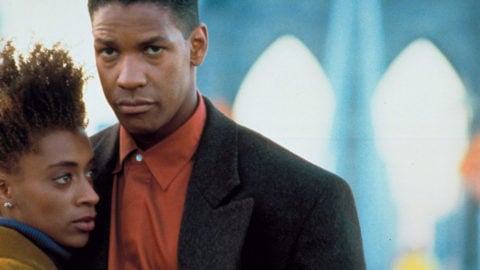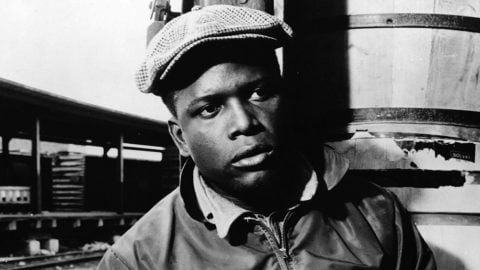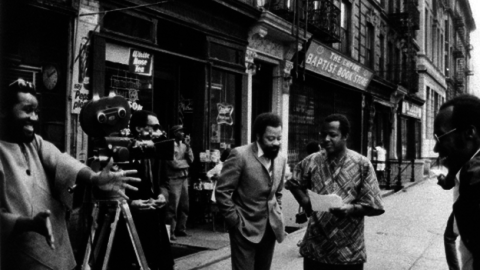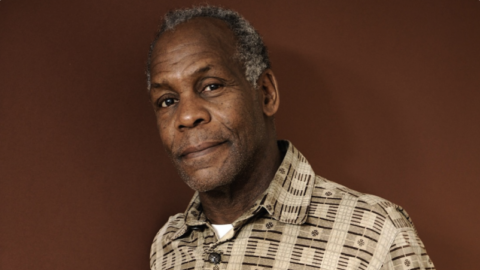Overlooked Black Performers
Throughout the ongoing discussion of diversity at the Oscars and in Hollywood at large—the types of films that get made, and who gets to make them—a longer historical view is often absent, or limited in its scope. In the hopes of fostering a deeper and broader appreciation of performances, and honoring those who have come before, FILM COMMENT arranged a discussion about overlooked and underappreciated black actors. In early February, Digital Editor Violet Lucca was joined by Ashley Clark, film critic and author of the book Facing Blackness (and this fine FC article on James Baldwin); and Ina Archer, co-chair of the Women’s Film Preservation Fund for New York Film and Television, longtime FILM COMMENT contributor, and former video artist, to tackle this topic. Over the course of an hour, questions of what could’ve been—and how old and layered this problem is—repeatedly crop up. The transcript of their conversation appears below.
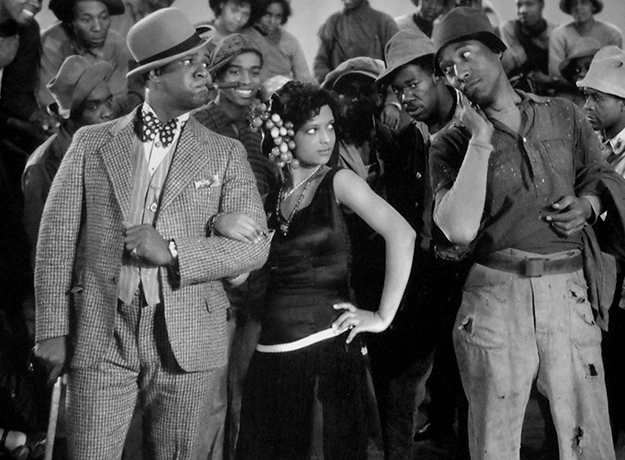
Hallelujah
VIOLET LUCCA: Today we’re talking about black performances and black actors. People who have been overlooked or underappreciated throughout history. In preparation, I asked Ashley and Ina to think about remarkable performers…
INA ARCHER: When I was thinking about this, the thing that came to mind was all of this potential. One of the people that I was just watching the other day was Nina Mae McKinney, whose career was in the 1930s. She was in King Vidor’s Hallelujah. Every time I’ve seen Hallelujah, if there’s another black person in the theater, they’ll comment about the dynamism of her performance in that film. At one point she was called the “Black Garbo,” but she ended up having to leave the U.S. She wasn’t featured in very many other films after this great beginning, although she had a great career outside of the film industry. She’s one of these people where you think, oh, they could’ve built all kinds of films around her!
In contemporary actors, I’ve been very interested in performers like Ne-Yo and Ludacris who can go between their known work and other kind of performances. They seem to have great potential as actors, if only they had someplace to lay that out. And the person who reminds me of that is Sammy Davis Jr., who was very much underrated as a dramatic actor, as well as his super versatility.
VL: What made Nina Mae McKinney so charismatic? How would you characterize her presence?
IA: She was very vibrant, and in the movie she’s presented with a huge amount of sexuality, but she’s also clearly acting. The idea that she was naturally a dynamo—that wasn’t just natural, it was performance. She used her eyes, and, physically, the way she performs in the film is something that maybe we don’t associate with black actors, especially in that time because of the kinds of roles they played. She had to play this loose woman, or conflicted woman, and you see that go through her face. She’s not afraid to be a bad girl. And that’s in a lot of her performances in shorts and soundies and Vitaphones where she plays this spirited person. In Hallelujah you get to see this other part to it that is a strain—but it’s not just pain. Later on, in Pinky, you associate her with this kind of loss, but for her as a performer, it’s actually her professionalism and her ability to tap into her performance ability. Not just natural musicality or these other things that get associated with black performers.
ASHLEY CLARK: There’s an interesting and ongoing debate about the constant exodus of black British talent to America. But looking back at the ’20s and ’30s, there were a lot of Black American actors who came to England, including McKinney, who I discovered recently. She starred in a film called Kentucky Minstrels by Harry Scott and Eddie Whaley who traveled to England and tried to make it there. And you’ve got people like Paul Robeson who came to England because of what wasn’t happening in the States. The British infrastructure didn’t nurture that talent effectively either. A lot of these issues that we talk of now go way, way back.
VL: Could you talk more about how these films were received?
AC: Stephen Bourne, a historian, has books like Black in the British Frame that I recommend and Black and White in Colour, co-authored with the American scholar Jim Pines. There are these histories, but unfortunately many of the films are lost, reduced to clips here and there. Speaking of these issues, I think we should give a shout-out to the underrated black actor Joseph Fiennes. [Laughter]
VL: He’s really struggled.
AC: He’s had it hard since Shakespeare in Love. He’s landed the role of a lifetime as Michael Jackson. He missed out on Tropic Thunder. It’s just been one setback after another. It’s for a special for Sky Atlantic in the U.K. We’ll suspend judgment for now.
VL: Aside from Mr. Fiennes, of course, who is another black actor you feel is overlooked?
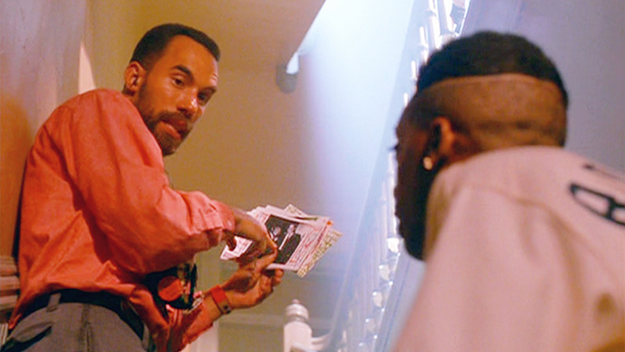
Do the Right Thing
AC: There’s a guy called Roger Guenveur Smith, who you will probably recognize most from playing the character of Smiley, the autistic character in Do the Right Thing. It was a role he insisted he play. I don’t think he was in the original script, but he pestered Spike Lee to include him in the finished performance. I saw that film when I was very young, probably 12 or 13. His performance really stuck out, and he’s a face that has cropped up time and time again. He crops up in Chi-Raq for a couple of minutes as a real estate agent.
VL: Evil, evil!
AC: Yeah, he always brings this sort of menacing quality to it. He’s an actor who, I think, can do a lot with a little. He also played Huey P. Newton in a one-man stage production that Spike Lee did a film version of. But he wrote and performed it himself. American cinema is full of characters like these. They’ve never headlined a film but have cropped up here and there and made an impact.
VL: Are there other character actors that you feel are noteworthy?
AC: There’s a guy called Bokeem Woodbine who’s currently starring in an against-type role in Fargo, on TV. He’s someone who’s been around the houses and you recognize him. Actors like Michael Beach. I know that Danny Glover is bigger than this. Even someone like him who mainstream audiences will know him as the guy from Lethal Weapon, this second-fiddle to Mel Gibson. But do people know quite how long he’s been around and how much he’s done? Things like To Sleep with Anger, these searing performances.
VL: Yes, To Sleep with Anger was just re-released in a restored version last fall. It’s unlike any other American movie, and it’s so wonderful. Danny Glover’s character is truly fascinating.
IA: It came up in my mind because I was trying to think of actors we don’t get to see, who go across genres. When I first saw that film and I really loved and talked about it, I had friends who didn’t get the film. I had a friend who saw it out in Utah who went to see it because they thought it was an action picture.
AC: Well, in the first scene the guy sort of sets on fire… [Laughter]
IA: It seems to me that it’s a mysterious stranger story, like a piece of Americana style. But there’s this idea of an unwillingness or inexperience with identifying with black stories, or not even stories, just black performers.
VL: The setup is universal but I can see what is potentially strange about it—taking this Southern black oral tradition and putting it in Southern California and into that community. The symbols that appear in the film, or the horrible grain alcohol that they’re drinking. These are very Southern things and they’re being taken out of their context and are “evil.”
AC: There’s a lot of symbolism. But the key is that the symbolism is not obvious. It’s not, oh, there’s a white doll. It’s symbolism that’s oblique, and it forces you to do a lot of work. But it’s funny and I think, absorbing and beautifully performed. There’s a great interview between bell hooks and Charles Burnett, and they’re really trying to wrestle with how to attract black audiences. To Sleep with Anger was an art-house darling in all sorts of ways, and black audiences didn’t flock to see it. We constantly see stories having a white interlocutor to make stories more palatable for white audiences—you’ll get a friendly white chap who’ll pop up and explain some things to the audience. To Sleep with Anger doesn’t have that. It’s a very internal film about that family. As you say, it’s about oral traditions and references to the migration and a rich musical tradition. And it doesn’t spell things out. I think partially that’s why it didn’t find the audience it should’ve. It’s a very challenging movie. But it shouldn’t be. It isn’t.
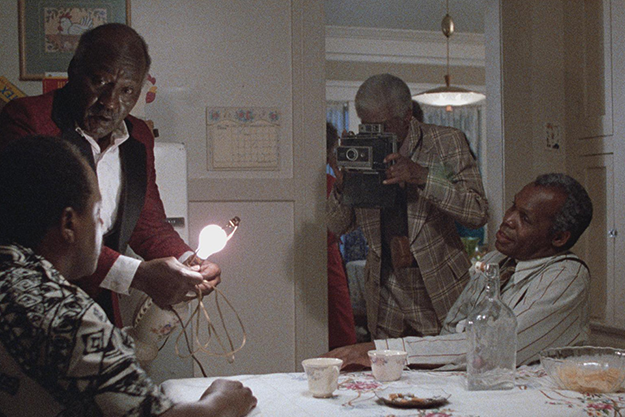
To Sleep with Anger
IA: Yeah. It’s universal, but its particularities are in black culture. But that could be any sort of family film if it was an Irish family or other kind of family, where the symbolism may be rooted in a particular place.
VL: Let’s talk about another undersung figure, now getting more play again thanks to restorations: Bill Gunn, Black independent American hero.
AC: I’ve watched Bill Gunn in two films. He directed Ganja & Hess. He’s in it for like five minutes, and I couldn’t get his performance out of my head afterwards. And of course he’s in Losing Ground. He wrote Rhinestone Sharecropping and his play, Black Picture Show, both of which have been recently republished courtesy of Ishmael Reed and The Film Desk. Again there’s this tragedy of people—and this is not related solely to race or blackness—who were not really known in their time and are not around to see this re-discovery.
VL: What makes his appearance in Ganja & Hess so electric?
AC: The film is a very strange elliptical pseudo-vampire movie from 1973, which stars Duane Jones and Marlene Clark. Duane Jones gets stabbed by his assistant, a kind of suicidal crazed man played by Bill Gunn and stays in his house in the middle of nowhere, in this palatial mansion. And proceeds to commit suicide. And he plays him for like five or six minutes. And he’s got this intensity that he brings to the role. He obviously wrote and directed the film and he throws himself into it with complete lack of caution and he tells this kind of filthy story, if I remember correctly. He just seems like someone who’s prepared to put himself out there, be very raw, and not compromise—a cliché, I know. But he doesn’t compromise his vision and uses himself as a conduit for this insanity.
Gunn wrote an amazing letter to The New York Times, calling out what critics were not respecting his work and not understanding where he was coming from. And there’s an intensity that comes through in his performance which reflects everything that he was going through. His film Stop was suppressed by Warner Bros, never released, and it still hasn’t come out to this day. Ganja & Hess was recut countless times under and boxed up under various blaxploitation titles—Blood Couple, Black Vampires and this kind of nonsense. The studio wanted to cash in on Black Dracula, in the blaxploitation wave. But it’s nothing of the sort. It seems to predate something like Bad Timing by Nicolas Roeg.
IA: In Losing Ground Gunn is playing an artist, and he plays a person who was so recognizable. Like, I’ve seen that guy—I am that guy sometimes. I know women who are with that guy. In all kinds of ways, this guy is in my family. And while feeling him very much as actor and as a performer and using his skills to really get to this kind of performance, I also think that it’s interesting he’s playing this person whose blackness is not his issue. It doesn’t come up as the pathology or the thing that you’re fighting against. He wants to be an artist. He wants to explore these women. It’s more like, how do I express myself as an artist? I find it very refreshing to see him be a bad guy.
AC: It’s a great portrayal of this swaggering male pride. He’s so swiftly pricked and injured.
IA: And he shows that really well.
AC: He’s on top of the world and then suddenly, bang! His wife is in search of her own inner life. And once the threat is there that she’ll find it, the world comes crashing down. And he performs that part really well. Also, it’s worth mentioning Seret Scott, who plays his wife, was a longtime associate of Kathleen Collins who directed Losing Ground. She gives a really wonderful performance in that film too, and is someone else who has had a few credits here and there but…
VL: It’s funny, Scott is like the cliché of if you take the glasses off and you take the hair tie off, she’s a beautiful woman! But as the film progresses, she finds her own way even though it’s through this ridiculous, overly arty student film.
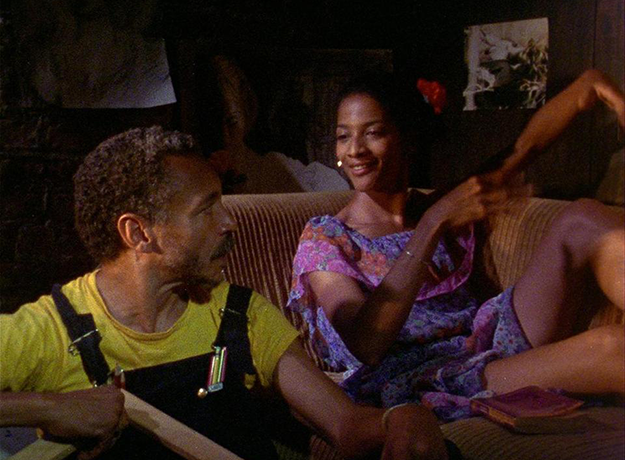
Losing Ground
AC: There’s another Kathleen Collins film, The Cruz Brothers and Miss Malloy, about three Puerto Rican brothers who are being spoken to beyond the grave by their dad, in a POV camera. They live somewhere in upstate New York, and they’re requested by this Irish lady to restore this mansion. It’s very literary—it’s based on a book—but it shows Kathleen Collins had this touch for mood and tone even with a small budget early on. I keep coming back to this: it’s people we haven’t heard of. People that we should know about.
VL: Ina, you were talking about contemporary musicians before—one of my favorites from childhood is Eartha Kitt. And if you look up any interview with her, she’s terrifying and amazing, beyond Beyoncé-fierce. Eartha Kitt will destroy you. How would you characterize her persona and what she would bring to different roles? It’s certainly more than Catwoman.
IA: I know her as Catwoman and I went to see her perform, but I saw her relatively recently in Anna Lucasta and I saw her in this completely different light. I enjoyed seeing her playing this character that’s within a middle-class black family, and in a natural situation even though it’s highly theatrical. Her ability to act, to be on screen, to be directed, and to work in that setting—it’s again impossible to understand why that wasn’t tapped into over and over and over again. But instead of focusing on what’s not there, or what didn’t happen, it’s interesting to me to think: what can we learn not only from seeing those performances, but from picking up these connections, where actors would be able to do all kinds of roles?
VL: That gets into someone else you had mentioned earlier, Sammy Davis Jr. Do you have a favorite performance of his?
IA: Well, I got to see him in “Stop the World—I Want to Get Off” but I was so young. I love him—everybody does or doesn’t—in Rufus Jones for President because I find that completely fascinating. It’s an early Vitaphone short synced on disc of films that were made right out of Queens. They experimented with making these short musicals using black talent. Sammy Davis Jr. is featured in Rufus Jones for President, Ethel Waters plays his mother. It’s a cabin-side fantasy of a little Sammy Davis Jr. who is five years old. She imagines him becoming president and it turns into a stage minstrel-show, but she imagines that he plays the president and she’s the presidentess, his mother. He performs several times… “(I’ll Be Glad When You’re Dead) You Rascal You.” It has a lot of minstrel trappings, it looks a little bit like Birth of a Nation in certain parts where you see the government portrayed.
AC: When did this come out?
IA: 1929? 1930? It’s early. And it gets shown when you talk about Sammy Davis Jr. where he’s half dancing, and he’s preternatural. And a star-maker. Overall, they can’t quite step away from the trappings of the minstrel show, with fried chicken and all that stuff. And jumping forward in his career, I really enjoyed Anna Lucasta, and his TV performances and his work with the Rat-Pack—but also the kind of character parts that I think of Frank Sinatra doing, and these dramatic and charming roles in the ’60s.
AC: One of the interesting things you mentioned is this racism and hysteria. Watching a lot of these films, it’s [sighs] difficult. It’s a challenge to see past the stereotypes, and it’s really interesting and look at the humanity that these actors were bringing to the roles despite the constraints being placed on them. I think of Bert Williams, the vaudevillian who performed in Blackface. Obviously he bowed to the expectations of the day. You’re sitting there watching it, and you’re falling into a trance of sorts. Because he’s so charismatic and the performance is so beautiful… and for a second you might just forget that he’s wearing Blackface. And you think “Shit!” You sit up, you realize it. These stereotypes persist in new forms, you see it in the “cultural conversation,” the “neo-Mammies.” I read in Variety a big roundup of what roles Oscar-winning black performers had been playing: it was “maid,” “welfare queen,” “criminal.”
IA: “Addict.”
AC: “Entertainer.”
VL: “Street informer.” [Laughter] That’s funny because speaking about, I remember turning on the TV, and it was that Sherlock show on CBS, Elementary. I thought I was watching The Wire because they were in the projects and it was every secondary character of The Wire. Or they’ll have the main characters that are white and they’ll go to the hospital where there’s a black doctor who’ll get one line. Or a black nurse who’ll shout at them. It’s always a background sort of performance.
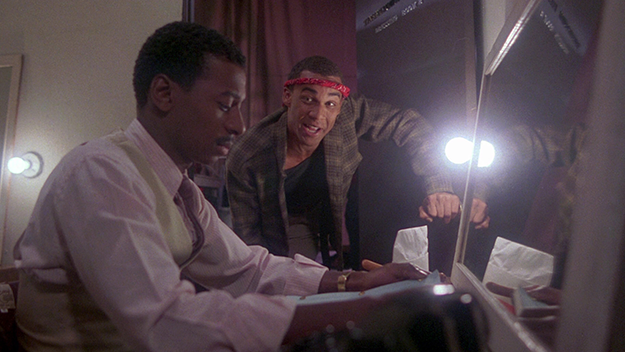
Hollywood Shuffle
AC: Last week, with Imitation of Life we talked about the ideas of inner lives and how I think in the schema of Douglas Sirk not presenting Annie’s inner life actually makes sense given the power of the ending and the fact that a lot of the emotional force rests on the fact that Lana Turner’s character couldn’t give a damn about their inner lives. But when you’re watching something, as I was doing recently, something like Hannah and her Sisters—a film that I love—and then you just see the black maid walking and you think, it’s the Hollywood Shuffle. You think, how many auditions did that character have to go through to give Michael Caine his breakfast… and fuck off again? It’s really frustrating to watch.
I mentioned Hollywood Shuffle, one of the great films about the frustrations of trying to make it as a black actor. Once you see it you can’t unsee it. And it creates a real tension. The other day, I was watching Dressed to Kill—where Nancy Allen is being chased out of the subway by a group of five hulking black brutes. It’s just like, wow! It really does stop you dead. Again, you start to think about how many auditions did these guys have to go through? And then you look at Brian de Palma’s Greetings. He kind of knows what he’s doing, pushing buttons with race…
VL: Or Hi, Mom!
AC: Yeah, “Be black, Baby.” It’s extraordinary.
IA: I had a similar experience watching Anesthesia the other day. There are two really important characters that are integral to what happens to Sam Waterston who’s a Columbia professor. This incident that happens, it’s like the Crash of New York City in the most negative possible way. Michael K. Williams plays one of the characters, and K. Todd Freeman plays a drug addict in the film and they’re friends—Michael K. Williams plays a lawyer. Speaking of the entire cast of The Wire. The movie was a commercial for Columbia gentrification, and the complete deracialization of a situation that is based on race. And I was really surprised by that. And then I read a review, the reviewer actually superimposed the two black actors in it. They’re not on the poster, they’re not listed on the main characters, and Michael K. Williams was completely folded into K. Todd Freeman so that their character actually became one. Like, he’s a lawyer and a drug addict who has potential. How much work did Michael K. Williams do and then they’re not acknowledged?
AC: You mentioned Sammy Davis Jr. earlier, and I’ve been thinking recently of the casting of Mike Epps as Richard Pryor. It’s an interesting circularity because Pryor started as a comic, moved into films, and only got Blue Collar, that one astonishing role.
VL: He’s excellent in that.
AC: He blows Harvey Keitel off the screen in that film. But Harvey Keitel, divisive actor but an established dramatic actor at that point, and Richard Pryor moved to stand-up to acting, directed his own All That Jazz-esque autobiography called Jo Jo Dancer, Your Life Is Calling in 1986 which is kind of a strange movie.
VL: There were a lot of problems with that production and it ended up not making up that money. He was supposed to make several films over 10 years, and then it just fell apart, and obviously Pryor had a lot of stuff going on in his personal life. It was one of those things: Hollywood, if you want to make this a test case, please do not because there was a lot of stuff going on.
AC: This idea that we’re always giving you one chance. We’ve given you a chance. You didn’t make it, sorry. Spike Lee said that about The Adventures of Baron Munchausen and Terry Gilliam. He said that the white boys get to fuck up over and over again. And we don’t. And that, perhaps, extends to actors. Especially if you don’t conform to certain comedy/action types.
VL: Absolutely. Let’s talk about somebody who does both. Ina, you mentioned Ludacris. What do you find appealing about him?
IA: I like his strange voice, and I guess surprise is part of it. Seeing him perform so convincingly and dedicated and thinking that I reduced him to—not reduced him—to an R&Ber or rapper, and that he probably most likely came through theater or other kinds of performing. It just seems like he could be comedic. I think he doesn’t have roles that are particularly stretching him. I find him very charming to watch.
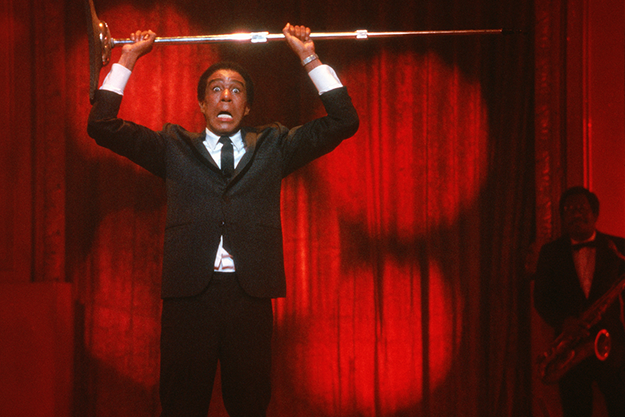
Jo Jo Dancer, Your Life Is Calling
AC: Both he and Larenz Tate deserve enormous credit for not shriveling up and dying on the spot in that car-jacking scene in Crash, which is arguably the worst scene ever filmed in cinema history. He earned my respect a bit. He’s an engaging performer. He’s got a lightness to touch; he’s got good comic chops, I think.
IA: I think the fact that they survived that film, but don’t necessarily go everywhere else, like everyone else who survived that film. Barely. They’ve gone and to make all other kinds of…
AC: The film is mass murder.
IA: It’s like the perfect horror story.
VL: Are there other people that we haven’t gotten to that you’d like to mention?
IA: I wanted to ask, was Bill Gunn a method actor, was he from the actor’s studio? For some reason I thought that he came through there. I was looking at what actors had come through the method. Sidney Poitier was there. I thought Harry Belafonte was, but I couldn’t find anything for that. I thought Poitier talked about it in his biography. Some people came up. Duane Jones. Al Freeman Jr. William Greaves. Paul Winfield. Diana Sands. I’ve been very curious about the idea of acting, training, methods, and how black actors or black performers might interpret that methodology. Is there a universal pool of emotions that everyone taps into? Or are black actors having to tap into a stereotyped pool of emotions that are already prescribed?
AC: Again I think of that black acting scene in Hollywood Shuffle.
IA: Exactly. They’re at the funeral where the uncle that they’re celebrating turns out to be Stepin Fetchit Number Two in some film, where everyone is horrified by his sort of “Hey, Massa!” performance…
AC: What do you guys think of Samuel L. Jackson? I was so fascinated by watching him in Chi-Raq, where he plays a spin on Mr. Señor Love Daddy, Dolmedes, the Dolemite reference. He’s the linchpin of Chi-Raq—and then the next minute he’s in the Tarantino movie. Fascinating how he vacillates between roles—and Stephen in Django, playing this kind of hideous Uncle Tom character. And he’s so ubiquitous. You see him in a Capital One commercial. He’s “Snakes on a Motherfucking Plane!” He’s in this, he’s in that. At this point, it’s easier to say what he’s not been in. Watching clips of Jungle Fever the other day, where he and Halle Berry are the crackheads, I wondered if he has also been undervalued as an fantastic actor, almost because of oversaturation.
IA: His performance in Eve’s Bayou, I think, was amazing, and underrated within his career. But I also think he’s one of the few who has that freedom to cross those different genres and types and characters. He’s allowed that choice because of his fame. Other people, other actors, don’t get that same opportunity. I don’t follow it a lot, but I think he takes the right tone as far as his comments about Tarantino. He kind of walks away.
AC: He’s very cool with it.
IA: I think that’s very canny of him. But I think some of his other activities that he does to help boost black people working in the industry are maybe not seen as much in the brouhaha.
AC: He gets paid. He works and he gets paid.
VL: I always think of…it’s one of those things, once you see, you can’t unsee…the Dave Chappelle “Samuel Jackson brew” sketch. “Why are you shouting?” “This is how I talk!” That made his appearance in Chi-Raq even funnier: the fact that he’s just there and shouts at you. He’s great at it, though.
AC: Dave Chappelle is fascinating too. The infamous story: he was doing a kind of blackface on the show and then a white crew member laughed in the wrong way, which struck Dave Chappelle hard and persuaded him to pack up and quit the show. And the double bind: double consciousness, and perception, and audience reaction, who you’re doing things for. This extends to what plays with a black audience. Suddenly when the spectatorship is broadened and white eyes are on it, what does that do?
I feel there’s a sense of loss that keeps coming up in this conversation. Every time I watch Bamboozled, which was a lot of times and I wrote a book about it (which is available now on Amazon). I watch that and it doesn’t matter what I’m doing, if I’m putting on a screening, if I’ve had a couple of drinks, if I’m seeing friends, I always break down and cry watching that montage at the end. It doesn’t matter what mood I’m in, what I’ve been doing. Because that fight conveys that sense of loss which underpins everything that we’re talking about—the obstacles that had to be faced and the extra work that black actors have traditionally had to do to overcome these stereotypes and restrictions. It’s very painful to watch.
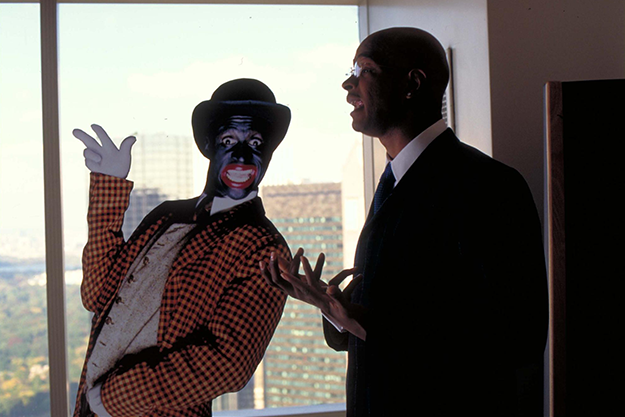
Bamboozled
IA: Certainly in the world of film preservation, there is a particular interest in these early films generally and those of the Thirties, where these characters come up over and over again. It’s this constant balancing: what do we do with this? I love this but at the same time, I have to withstand this kind of painful art. Sometimes painful, sometimes annoying, depending on your mood and how much you can take of it at certain times, and it makes the idea of preservation sometimes difficult. So there’s a sense of loss but also trying to hold on to this material, some of which is abhorrent in many ways but has to be seen. And how to contextualize it—and make it resonate and not lose actors like Hattie McDaniel or John Bubbles.
We were talking before about being within a black world, and then that character maybe not being quite as disturbing. If all the characters are black, he’s just another shiftless person rather than all of black people personified.
AC: Yes, becoming a representative of the race. The burden of representation.
IA: Yeah, and having it balanced out by films made by black people at the time or looking at performances. We feel that loss and wishing that there was more of these… I was watching Stormy Weather the other day and they had a bunch of things on Turner Classic movies. The Green Pastures actually… And I was old enough that if any of those films came on television, it didn’t matter what time it was, my parents would get me up to watch the conclusion of Stormy Weather, to see the Nicholas Brothers and see Cab Calloway… I choke up about it now but it was important for them, and within that film to see those performances. They were really meaningful despite the fact that they really didn’t enjoy movies from those times because of the stereotypes. But I feel like that emotion that happens and I think that has to be passed on more and more, so that the connection with these older films can be made. I think the OscarsSoWhite thing is good pushback. It needs to start happening. In one way, I thought: “Again? What’s new?” They did that two years ago.
AC: The Richard Pryor speech in 1977 at the Oscars. Eddie Murphy in ’88, I think. So this is like 40, 30ish years ago. Pretty much the same things that Chris Rock will likely be saying.
VL: What is the function of the Oscars fundamentally? The function of the Oscars is to say: “Look how great Hollywood is.”
IA: Yeah: “Congratulations!”
AC: Every time I get cynical about the Oscars, which is frequently—you can put in “Jamie Foxx Oscar Acceptance Speech” and you watch that and you see what it means to him. You are hit with this force of the tragedy and the complication of craving validation and having it bestowed upon you by an organization and an establishment that doesn’t really care about you. And that’s very powerful to watch. I wish we could all say: “Fuck the Oscars. They don’t matter.” But they do in terms of what they do for people’s careers.
IA: I think that Hattie McDaniel’s speech is very poignant. I did a piece about that quite a while ago, an installation piece that was all about the taking apart. I felt for her being acknowledged in a place where she was really being shunned at the same time. The Oscars show supports the activities of the Academy, and one of the things that the Academy does is to support film preservation. Those films are being supported in ways that they haven’t been, and so it seems to me that they would benefit the Academy to make the show more representative of the things that they are trying to do now. It’s not just this glamour thing that happens. If the whole infrastructure falls apart, the losses again are smaller films, independent films, preservation, and those kind of things. And that’s how they got us by the shorthairs here.



